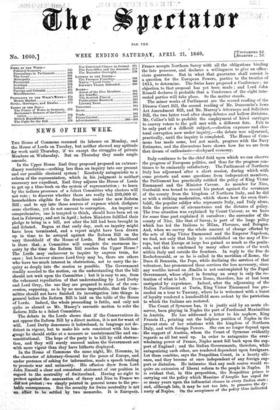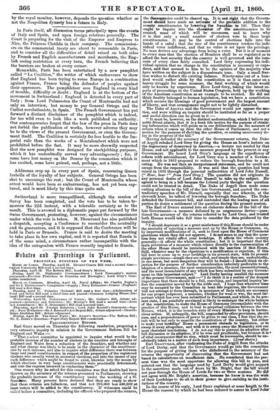Italy continues to be the chief field upon which we
can observe the progress of European politics, and thus far the progress con- tinues to be eminently satisfactory. The Parliament of Northern Italy has adjourned after a short session, during which with some protests and some questions from independent members, the Parliament has practically ratified the policy of King Victor Emmanuel and the Minister Cavour. As member for Nice, Garibaldi was bound to record his protest against the severance of the county from the kingdom of Northern Italy, and he did so with a striking moderation, which shows how far even Gari- Valdi, the popular soldier who, represents Italy, and Italy alone, feels the pressure sifecircumstance and the dictates of policy. The true situation was explained by Count Cavour, as we have for some time past explained it ourselves ; the surrender of the county of Nice, like that of Savoy, is part of the large policy which has led the Italians to Milan, Florence, and' Bologna. And, when we survey the whole amount of change effected by the acts of King Victor Emmanuel and the Emperor Napoleon, we find, not only that Italy is reestablished on the map of Eu- rope, but that Europe at large has gained as much as the penin- sula, and this is confirmed by many other events of the week within Italy and outside the frontiers. In reply to the Due de Rochefoncauld, or as he is called in the meridian of Rome, the Dues di Benaccia, the Pope, while declining the services of that volunteer, has pronounced those services the less necessary, since any warlike inroad on Amnia is not contemplated by the Papal Government, whose object in forming an army is only the re- tention of what is left. Even Rome, therefore' has at last been castigated by experience. Indeed, after the adjourning of the Italian Parliament at Turin, King Victor Emmanuel has pro- oeeded on a tour to Tuscany, where he is welcomed with a burst of loyalty rendered a hundredfold more ardent by the patriotism to which the Italians are restored.
The Count of Syracuse has, it is justly said by an acute ob- server, been playing in Naples the part of Ferdinand Maximilian in Austria. He has addressed a letter to his nephew, King Francis II., pointing out the helpless position of Naples in the present state of her relations with the kingdom of Northern Italy, and with foreign Powers. She can no longer depend upon the support of Austria, whom the Count of Syracuse evidently regards as all but used up. In order to antagonize the over- whelming power of France, Naples must fall back upon the sup- port of England ; and the Italian Governments, therefore, while antagonizing each other, are rendered dependent upon foreigners. Let them combine, says the Neapolitan Count, in a hearty alli- ance, and they become at once independent of any foreign sup- port or dictation. He intimates that any such course would re- quire an extension of liberal reform to the people in Naples. It
is evident that, in this proposition, the Neapolitan prince is carrying out the policy which Massimo d'Azeglio has urged for so many years upon the influential classes in every Italian state ; and, although late, it may be not too late, to preserve the dy- nasty of Naples. On the acceptance of the policy thus indicated
by the royal monitor, however, depends the question whether or not the Neapolitan dynasty has a future in Italy.



























 Previous page
Previous page